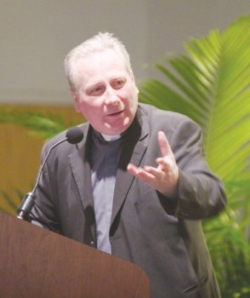Conference marks 40th
NEWTON — Boston College and Brandeis University hosted a two-day conference March 16-17 to celebrate the 40th anniversary of “Nostra Aetate,” the document from the Second Vatican Council that changed the Catholic Church’s view of her involvement in interreligious dialogue. “Nostra Aetate” is Latin for “In our time,” the first words of the document.
The event, titled “In Our Time: Interreligious Relations in a Divided World,” explored the nature of interreligious dialogue in the world today.
The conference began at Brandeis University with a keynote address by Archbishop Michael Fitzgerald, former president of the Pontifical Council for Interreligious Dialogue. Pope Benedict XVI recently named Archbishop Fitzgerald as the new nuncio or papal ambassador to Egypt and the Arab League.
Archbishop Fitzgerald’s comments were followed by a panel discussion on “Issues and Challenges in the Interreligious Encounter” where panelists said interreligious dialogue must be approached with an open mind.
Imam Talal Y. Eid, founder and director of religious affairs at the Islamic Institute of Boston, said that he told a Catholic seminarian who believed all Muslims go to hell, “If I told you that you are going to hell because you are not a Muslim and you tell me that I am going to hell because I am not a Christian, one of us is going and one of us is not going. We can’t determine.”
Philip A. Cunningham, executive director of the Center for Christian-Jewish Learning at Boston College, said that it is important to truly listen during interreligious dialogue rather than trying to convert the other. If the goal is baptism, the conversation will change, he said.
“That’s going to proportionately close me down to hearing the others’ experience of God, which is the whole purpose of dialogue in the first place,” he said.
“The purpose of dialogue is not necessarily to reach an agreement,” agreed Ruth Langer, associate professor of Jewish studies and associate director of the Center for Christian-Jewish Learning at Boston College.
The critical task is to communicate well and use language in a way that all participants can understand how each believer responds generously to the word of God.
“It’s not just simply a question of theological language — it’s a question of how we speak about our own theology when there are others in the room listening so that they hear what we mean,” she said.
After the panel discussion, the symposium moved to Boston College where Cardinal-designate Seán P. O’Malley delivered an introduction followed by another keynote address by Archbishop Fitzgerald on the topic of “The Promise of Interreligious Dialogue for a World in Conflict.”
Cardinal-designate O’Malley stressed that Christians, Jews and Muslims are all the spiritual children of Abraham.
“We have so much in common and yet because of so many historical facts we find ourselves at the point we do today. The only way we will move beyond this is a greater understanding and appreciation for each others’ traditions and faiths,” he said.
Archbishop Fitzgerald said many of those conflicts throughout history have been rooted in economic, social, political and racial factors that have been aggravated by differences of religion. He warned that dialogue is not a fire brigade that can resolve conflict.
“It is more in the nature of preventative than curing medicine,” he said.
Interreligious dialogue will help people to learn to live together in peace by helping them to forgive the past, obtain mutual understanding and work together.
“Nostra Aetate” articulates that the Catholic Church rejects nothing that is true and holy in other religions, he added.
Maria Costa, a parishioner from St. Malachy Parish in Burlington, said the conference was one sign of the Church’s dedication to bring people together and work with them.
“We are Catholic and we are trying to raise awareness to the holiness and truth of other religions. It makes me even more proud of being Catholic. It speaks to who we are,” she said.
<



















